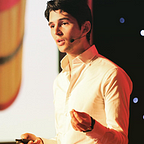What made Zombies Run a success?
Zombies, Run! is the world’s most popular smartphone fitness game. Over one million players bought the app at a price of $3.99 to $7.99, with hundreds of thousands playing every month. Since that, they have switched to a free-tester and subscription revenue model, and grown to almost 3 million users.
I was happy to find their founder and CEO, Adrian Hon, as a fellow speaker at the Marketing Management Kongress in Berlin, and couldn’t resist to ask him about the organisational details. Unsurprisingly, their story holds several valuable lessons that are applicable across the board.
Before funding Six to Start (the company behind Zombies Run), Adrian was Director of Play at Mind Candy, where he designed and produced the Perplex City ARG. He studied neuroscience at the University of Cambridge, the University of Oxford, and the University of California at San Diego. However, he insists psychology and neuroscience have had little to do with the success of the game.
Instead, the company combines the power of storytelling and gaming to create an app that will remain engaging throughout the many hours that are necessary to incorporate the habit of running into our daily life.
Adrian was starting to run in 2011 and found it particularly unpleasant compared to the sportsmanship idea that Nike or Adidas try to portrait. This lead him to think that a running app that was actually encouraging would be fun to do and could make some money. Coming from gaming, he thought this could be achieving by immersing the runner in a motivating and responsive story.
Adrian had worked on several occasions with Naomi Alderman, an award-winning novelist. She was also starting to run at the time, and the two discussed the project. Then, while Naomi was joining the running club, the instructor asked why they wanted to start running, and a woman replied ‘to survive a zombie apocalypse.’ The idea for Zombies Run was born.
Although either of them is a zombies fan, the theme had two strong points that made the choice: 1) everyone knows what zombies are and how they work. 2) it makes for a coherent plot: if there is a zombie apocalypse there are no cars, so it makes sense to be running.
The team took a fast iterative approach. They studied the feasibility and launched a Kickstarter campaign which was a success, raising over $70k. From that point onwards, they could be confident that there was a market for their idea and the key became execution. It took them only 3 months to have the first playable version ready, and they were able to get feedback to build upon.
“Zombies run is a very simple idea,” says Adrian, but working with an old colleague greatly facilitated the project. “There was a lot of trusts and we knew what each was good at, what we liked. The difficulty I see with other companies or students is that they don’t know each other”.
We know from our experience at Conductal that having a common goal and trusting each other is the basis for effective teamwork. Zombies Run is not different. In Adrain words: “The other really important thing is that I know she is a better storyteller than I am. A lot of game designers would try to change things, but she is the expert, she has control over the story, I have control over the game design. Talking through everything is not always appropriate.”
Six to Start successfully applied an iterative approach and effective delegation to developing Zombies Run, resulting in a great product. They benefited from having a clear vision and a long standing work relationship. However, they also benefited from having a strong idea to begin with.
On our way out, I told Adrian about the processes we use to encourage innovation and creativity in companies and he was happy to corroborate:
“It is important to have a lot of friends who do many different things. I am a friend of scientists, lawyers, doctors, writers, artists, etc. That’s is where you get your ideas from. If all you do is play games or hang out with colleagues, it’s boring. However, you can’t expect that to pay off immediately. I have been doing this for 12 years and have only had 3 good ideas. But turns out that is good enough.”
At Conductal we help organizations to develop the processes and culture to continuously innovate, allowing them to thrive in complex and changing markets.
Daniel Ospina
Director at Conductal
Co-Founder and Steering Group lead Crossmodalism
Associate Fellow at CenSes, Institute of Philosophy, University of London
Experience Designer in Residence, Crossmodal Research Laboratory, University of Oxford.
